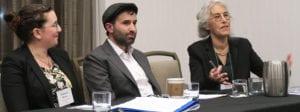
Adrienne Krone of Allegheny College (left), Alex Weisberg of New York University and Laurie Zoloth of the University of Chicago field questions on Jewish environmental ethics during the opening of the Society of Jewish Ethics’ annual meeting on Jan. 3 at the Marriott Louisville Downtown. (photo by Lisa Hornung)
A world without bees? The Society of Jewish Ethics addressed that chilling scenario, and others, when it made environmental ethics the topic of its opening – and public – session at this year’s three-day annual meeting in Louisville.
Adrienne Krone of Allegheny College presented her paper, “Taking Students in to the Field(s): Teaching Jewish Environmental Ethics through Co-Curricular Programs,” and doctoral candidate Alex Weisberg of New York University presented his paper, “Jewish Environmental Ethics Reconsidered.”
After the papers were presented, Laurie Zoloth of the University of Chicago presented a critical response to both.
Speaking on the challenges of teaching Jewish environmental ethics, Krone said she once tried to take her Hillel students outside to celebrate Rosh Hashanah with apples and honey, but the group got swarmed by bees and ran away, despite her effort to explain how critical they are to the food supply.
She found that students respond best to experiential teaching, such as alternative spring break trips and summer trips to Jewish farms that practice sustainable and ethical agriculture.
“The practitioners and activists that my students encounter in the field help my students understand why Jewish ethics is not only relevant but a central component of Jewish teaching historically and today,” Krone said.
Weisberg discussed the linguistics of the Hebrew Bible’s use of the word “wilderness” in Genesis and interpretations of man’s entanglements with, and responsibility, to nature.
There is “no concept of nature that stands outside us,” he said. “The entanglement of humans and non-humans cannot be easily untangled, and that nature and culture cannot be divided.”
Zoloth said Krone’s focus should branch out from Jewish ethical farming to local activism in Meadville, Pennsylvania, where Allegheny is located, and where high unemployment and opioid addiction are serious problems.
“Why accept risks of such a trivial issue of apples and honey to learn the tragic at the heart of Rosh Hashanah – that no water can wash away our deep and sinful and mistaken participation at the exploitation and death at the heart of modernity, to confront that – now that’s worth getting excited about,” Zoloth said.
Fielding questions after the papers were presented, Zoloth said modern environmental ethics calls for significant changes in society.
“I love reading the rabbis. I think they’re extraordinary,” she said. “I love the Jewish farming movement, and they’re doing great things. It’s just not enough. Have you all read the last U.N. report? It’s 10 years, folks. It’s not enough. Whatever we’ve done isn’t enough, and we have failed really horribly.”
SJE Executive Committee President Aaron Gross addressed practical ways his group can soften its environmental footprint: The SJE is considering taking a sabbatical every seven years by not having an annual meeting.
“We have people coming from Israel, California, we get these hotels, we spend a lot of money in restaurants,” Gross said. “Let’s just every seven years stay in our communities and do environmental work.”
SJE also just began serving all-vegetarian meals at the conferences.
“Those discussions here also have implications for other Jewish institutions,” Gross said. “Every Jewish institution could ask, ‘What should our food policy be, given our values, how should that shape through?’”
Krone’s teaching of Jewish environmental ethics to college students is important, Gross continued, noting that type of instruction was not happening 15 years ago.
“[When] we start having these discussions at a society like this, people feel emboldened and we see the scholarship. Then that creates a space to spend time in seminaries, college classrooms, in the training of our rabbis, to raise these issues, where it then goes into the broader community that decides to data fetch.”
But will academic papers presented at a conference make a difference in official U.S. environmental policy?
Gross thinks so.
“This is a peculiar gathering insofar as we talk to each other in an insider language,” he said. “But in other forums, the same people here are doing an interview in a class or advising a presidential council or directing a donor who wants to give $10 million and how they can do that in various ways. It’s my observation that conversations will start here and go out and affect the world.”
In the panel discussion, Zoloth expressed frustration with the fact that the U.S. Environmental Protection Agency hasn’t funded enough research to keep data current and that she can’t convince all her children to become vegetarians, despite terrifying data from the United Nations.
Confronting a looming concern to environmentalists, she said, “It’s not a forest or tree-problem. I would argue, it’s always a problem of justice. We need to build an environmental ethics that is never separated from the demands of justice.
“I’d urge Krone to push her students – to push your students – to do more to move into our current terrifying catastrophe, she added, “which is, of course, global warming. And to really confront a world in which there will be no bees at all.”



